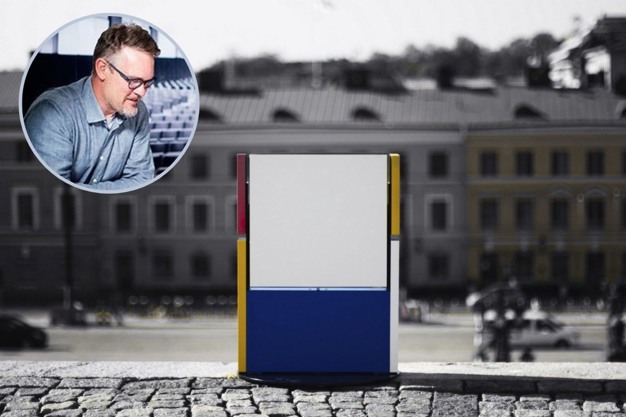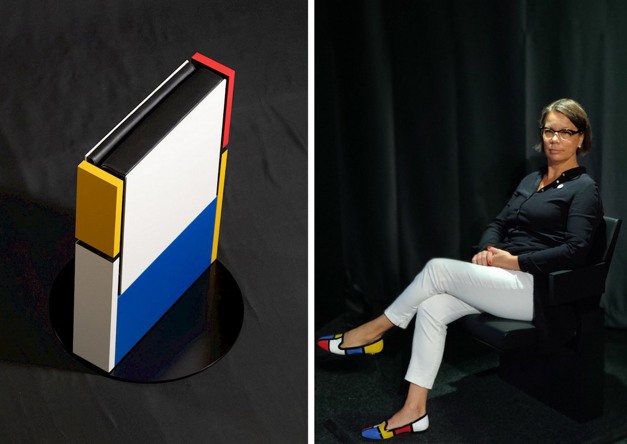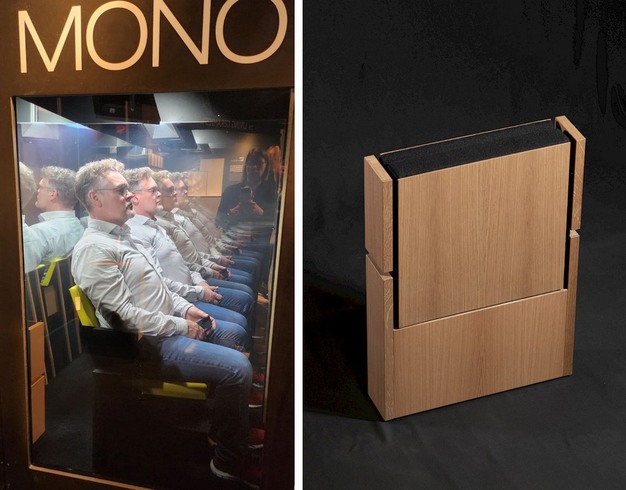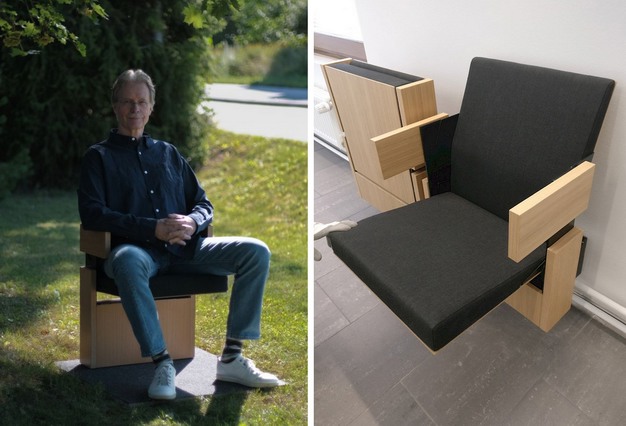Named after a small Finnish village, the company Hamari delivers auditorium solutions around the world. 'Two identical auditoriums don't exist,' says Jari Jääskelä, CEO and founder of the company. 'In cooperation with clients and designers. We combine desired form and the selected materials to create functional entities, including architecturally demanding installations.' We talk to the founder to know more about the company's recent anniversary, its exciting projects, including the Swedish and European Parliament, and the market conditions at the moment.
 Jari Jääskelä and the Mono Chair. Photo: Kaspian Gröndahl.
Jari Jääskelä and the Mono Chair. Photo: Kaspian Gröndahl.
10 years of Hamari
From a surprising background as a blacksmith, Jari started in the industry in the 90s. 'We bought the company 10 years ago from the company where I was responsible for the business since 2006.' He shares some of Hamari's greatest achievements since starting the company a decade ago: 'Our first project after the acquisition was a meeting with a project group. I began by sharing a bit of my work history and concluded with, "and now we've bought this business and will continue." Their response was, "good, let's see the samples then". At that moment, I knew this was going to work.' This positive response jumpstarted the business. Named after the Finnish village of Hamari, the company has since grown into a global provider of bespoke auditorium solutions.
'That was definitely a key milestone. Achievements can be subjective—whether it's a significant accomplishment or the result of hard work depends on perspective. For us, delivering a project and then having the same customer return for another project one to two years later is a true achievement,' Jari explains further.
The company recently delivered movable benches to the French Senate in Paris in 2023 and has previously delivered furniture to the Swedish and European Parliament. When asked how Hamari landed these jobs, Jari says: 'It's all about connections. We're lucky, because we have good connections in each country who work with us and help us. These projects really show the importance of building strong, long-term connections in each country.'

The Mondrian version of the Mono and on the right, the shoes of co-founder Tea that inspired the colour palette.
Challenges...
Aside from the exciting projects, the international auditorium business also has its challenges. 'The most challenging are the set rules for public spaces. Sizes of passageways for example are determined by local regulations. In the EU it's the easiest, because it's the same for different countries, but in the US and Canada for example there are different logistics and flammability requirements. A project therefore takes approximately one to two years, if not longer.'
As for the market conditions, Jari says the following: 'The COVID-19 pandemic was actually beneficial for us, as we saw increased activity in Finland. For once the premises were empty for renewing the rooms. Although it of course fluctuated. In 2022, when Russia attacked Ukraine, I knew that competition in Europe would become tougher. We operate in a niche market, so maintaining a steady flow of projects is always challenging, but we have consistently aimed to be present in different markets. Our projects can range from Cyprus to Germany. In the furniture industry, the big companies are getting bigger, but I believe there is still room for those of us who are not large in size but are innovative and adaptable.'
... and trends
One trend Jari has observed is the rise of multipurpose rooms: 'They can be used for studying during the day and hobbies in the evening. We offer suitable products, like movable benches and telescopic seats, that address this need. This concept is also applicable to theatre settings. Additionally, a trend we've noticed is the use of large stairs where people can sit with pillows and charge their phones. In the coming years, I believe we can develop new products to cater to these trends.' In Finland specifically, current trends include the use of plywood, fabric, and metal, according to Jari.

At the fair introducing the Mono Chair, there was a Mirror Box. Jari is demonstrating the effect in the picture. 'Who said that Hamari does not have scalable sales!' he says.
Neocon Fair in Chicago
Hamari's Mono chair recently won the HIP Award at Neocon Fair in Chicago. Made in collaboration with designer Philip Kronqvist, the chair has a unique mechanism for good ergonomics. 'It has a wow-effect, which is harder and harder to get in today's world,' says Jari. 'The collaboration with Philip started when we were working on the Turku City Theatre project together in 2017. We noticed there was a demand for "invisible" seats for doormen, that sit in during the show in case of an emergency. Designing the seat was quite complicated. It had to flip out of the wall and be open for use. Four years it took us to get it to work properly, with several "updates". Funny, because we are making a chair, not a computer program,' Jari laughs.
Now Hamari has developed four different solutions: a fixed theatre chair, a wall mounted version, a turnable spin version and a foldable one for telescopic stands. They also made a "Mondrian" version of the chair. 'It's a funny story. At the first fair where we launched the black Mono in a black stand and very rarely people would recognise it as a chair. Instead, they paid attention to co-founder Tea's Mondrian shoes and I said: "the next one we will make in colour of these shoes."
What can we expect from Hamari in the future?
'I am not superstitious, more pragmatic and I think it's wise not to guess what is next. It can be in France or in the Netherlands, or in a completely different place. That's what keeps this interesting for the next 10 year,' Jari explains. Business always fluctuates according to him. At the moment they have some new business in Estonia. And they recently got a design patent for the US markets for Mono. 'I'm really excited about it. The process took four years to get to Necon in mid-June, but the patent will be in effect for the next 15 years, so now it's time to sell.'

On the left: designer of the Mono Chair, Philip Kronqvist. On the right: the Mono Chair when it's open.
More information:
Hamari
Runeberginkatu 34 e
FI-06100 Porvoo, Finland.
www.hamari.pro
Jari Jääskelä, CEO
+358 50 502 4731
[email protected]
